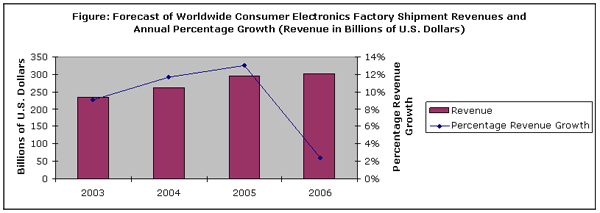Apple's iTV delay doesn't help "dull holiday season" - report
With delays, competing standards and inventory shortages plaguing the consumer electronics market, there may not be one killer application this holiday season that emerges to capture the attention of shoppers, says one research firm.
Normally, the firm said, such a delay might provide a great opportunity for another company to steal the spotlight with a hit holiday product. But it sees competing standards and product shortages as making that much less likely during the hottest shopping period of 2006.
"These issues also are among the factors contributing to a slowdown this year in consumer electronics equipment overall," the firm said. "Factory equipment revenue will only rise 2.4 percent to reach $302.3 billion in 2006, compared to 11.6 percent and 13 percent growth in 2004 and 2005, respectively."
iSuppli believes many of "this year's wannabe hot products" have been designed to leverage strong sales growth for Digital Televisions that support High Definition video, such as HD-video DVD players. But those too are expected reflect much slower growth as a direct result of the ongoing battle between the HD-DVD and Blu- ray standards.
"Many consumers are waiting for a winner or, more likely, the emergence of dual-standard players and/or disks in time for next year's holiday season," the firm said. "Although both sides will claim otherwise, neither standard has a true technological advantage."
While the HD-DVD camp, headed by Toshiba, got a head start by entering the market in the late spring, iSuppli said its initial offerings have drawn criticism due to slow performance and a lack of full 1080 progressive-scan HD video output. Meanwhile, the Blu-ray group, led by Sony, has encountered its own shared problems that are spilling over into the video game console market, forcing a cut in holiday shipments of products like the Playstation3 down to about 2 to 2.4 million units.
iSuppli believes Microsoft, struggling to gain acceptance with its Xbox 360 series, may be shifting its focus somewhat from the video game market to the MP3 player market, where it plans to launch its new Zune player in mid-November.
"The company may consider this timing a good opportunity since its main competitor, Apple, has yet to launch any significant new iPods so far this year," the firm said. "The second-generation nano adds spiffy new cases, but still does not support video. And the latest hard disk-based flagship iPod, which merely adds a brighter display and more storage, is a far cry from the much anticipated “true video†iPod featuring a larger, landscape-oriented display better suited for watching movies."
Still, the firm acknowledges that Apple's recent iPod launches did increase pressure on Microsoft by continuing to raise the basic value of storage per dollar. It also believes Microsoft has created another serious challenge for the Zune by replacing PlaysForSure with a new proprietary Digital Rights Management scheme.
"This change means that any content purchased through the Zune Marketplace will only work on a Zune player and not on PlaysForSure devices made by Microsoft customers like Creative Technology Ltd., SanDisk Corp., Sony and many others," the firm said. "As such, Microsoft could further alienate customers already concerned that a key software supplier is now also a competitor for players."
The writing appears to be on the wall, as SanDisk has already announced a three-way partnership with RealNetworks Inc. and Best Buy to develop its own content-hardware ecosystem to rival those from Apple and Microsoft.
 AppleInsider Staff
AppleInsider Staff











 William Gallagher
William Gallagher

 Mike Wuerthele
Mike Wuerthele
 Christine McKee
Christine McKee

 Malcolm Owen
Malcolm Owen
 Amber Neely
Amber Neely








